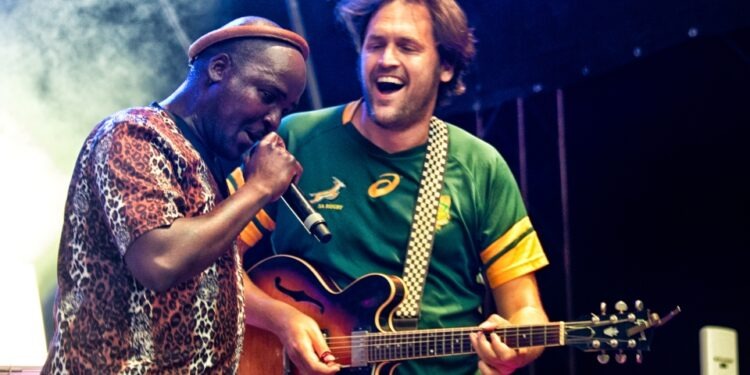 When Dutch guitarist-producer Joep Pelt returns to South Africa this month he will not be here to play another headline set: he’s here to listen, to document and to turn living, oral guitar traditions into a structured learning path for the world. The project — Guitar Globetrotter — is a new education platform Pelt plans to launch in spring 2026 that stitches technical lessons to cultural history, using three South African masters as its centrepiece: Themba Mokoena, Ntokozo Zungu and Mbuzeni Mkhize.
When Dutch guitarist-producer Joep Pelt returns to South Africa this month he will not be here to play another headline set: he’s here to listen, to document and to turn living, oral guitar traditions into a structured learning path for the world. The project — Guitar Globetrotter — is a new education platform Pelt plans to launch in spring 2026 that stitches technical lessons to cultural history, using three South African masters as its centrepiece: Themba Mokoena, Ntokozo Zungu and Mbuzeni Mkhize.
Pelt is not a casual visitor. For nearly two decades he has collaborated with South African musicians and produced cross-cultural projects such as Soweto Soul and the collaborative album Djam!, and his Guitar Globetrotter website has long chronicled his travels and partnerships. That background gives the platform a practical anchor: this is pedagogy built on relationships, not a top-down course shoehorned into local styles.
Three masters, three traditions
Pelt says the platform’s first modules will focus on styles passed “hand-to-hand, ear-to-ear” — forms rarely codified in institutions but vital to South Africa’s sonic identity. The artists selected reflect that breadth.
-
Themba Mokoena embodies the guitar languages of Mbaqanga and Marabi: elastic rhythms, cyclical phrasing and a jazz-inflected vocabulary that links township dance music to jazz improvisation. Mokoena’s reputation as a stylist and teacher in these idioms is well-documented in contemporary South African guitar pedagogy.
-
Ntokozo Zungu is the lead-guitar voice behind Stimela and other major South African acts; his playing carries the seam between Afro-fusion and soulful, narrative guitar lines that defined many township bands after the 1970s and 80s. Zungu’s long studio and live career makes him a keeper of phrasing, tone and repertoire that younger players still emulate.
-
Mbuzeni Mkhize represents Maskandi, the Zulu-rooted, fingerpicked storytelling guitar tradition that remains central to KwaZulu-Natal’s musical life. Mkhize’s recent work and festival appearances show him operating at the genre’s contemporary edge — fusing old techniques with new contexts.
Taken together these artists let Pelt present a curriculum that moves from rural-rooted picking (Maskandi), through township polyrhythms (Mbaqanga/Marabi), to stage-ready Afro-fusion (Stimela and post-Ray Phiri lineages).
What Guitar Globetrotter will offer
According to Pelt’s project notes and prior releases, Guitar Globetrotter will pair step-by-step technical lessons with documentary films, interviews and score-like transcriptions that explain not only how to play a lick but why it sits where it does in social life. The platform aims to be global in reach while keeping the teaching authentic: video sessions filmed in South Africa, historical primers to contextualise rhythms and chord choices, and downloadable practice material for different skill levels.
Pelt will co-produce the South African content with Johannesburg-based filmmaker Themba Mahori and Dutch director Bart Verhoeven, a pairing intended to combine cinematic storytelling with musical rigour. Early trailers and press notes for Soweto Soul and Djam! show Pelt’s interest in marrying high-quality audio production to clear educational narrative — a template likely to inform Guitar Globetrotter’s format.
Why this matters now
Traditional guitar techniques in South Africa — whether the fast, narrative picking of Maskandi or the cyclical groove of Mbaqanga — were historically transmitted orally. As globalised, screen-driven learning proliferates, Pelt’s project proposes a middle way: rigorous, digitised tuition that preserves nuance (feel, inflection, microtiming) while making it accessible to international learners. This is preservation through practice, not mere archive.
There is also cultural reciprocity at stake. Pelt’s long association with South African artists (and the fact that he grew up immersed in South African records) reframes the platform less as an external appropriation and more as a collaborative export: South African techniques taught by South African masters, produced for a global audience. That model can generate income streams and visibility for local players while giving students worldwide rare, living access to stylistic subtleties.
The road ahead
Guitar Globetrotter is scheduled to launch in spring 2026; the South African shoot in October 2025 is presented as the platform’s foundational fieldwork. If the early material — the documentary shorts, lesson sets and practice packages — matches the ambition behind Pelt’s prior collaborations, the platform could become a sustainable digital home for guitar styles that have long been under-documented. For students, it promises the rare chance to learn these idioms from their keepers; for the musicians involved it promises a new archival and revenue channel.



































